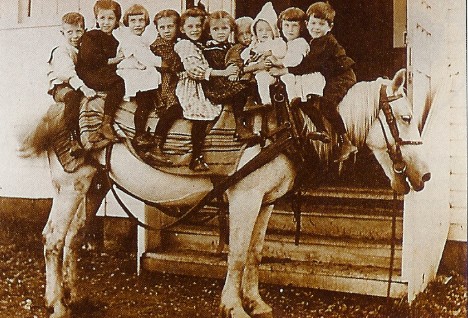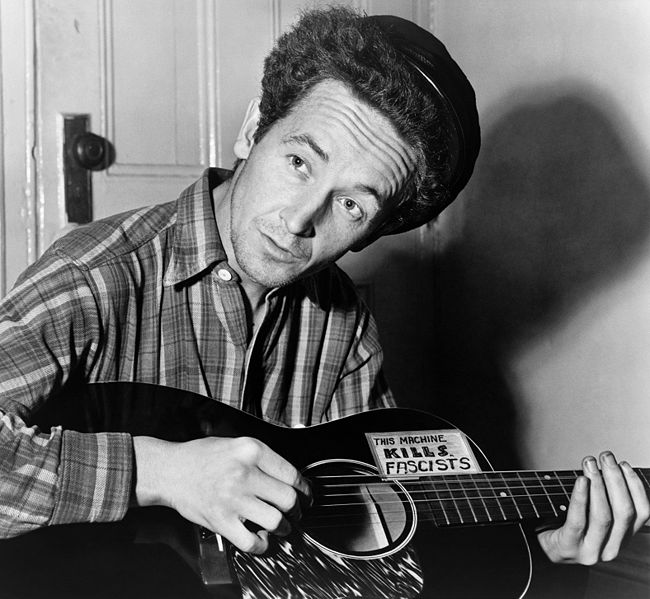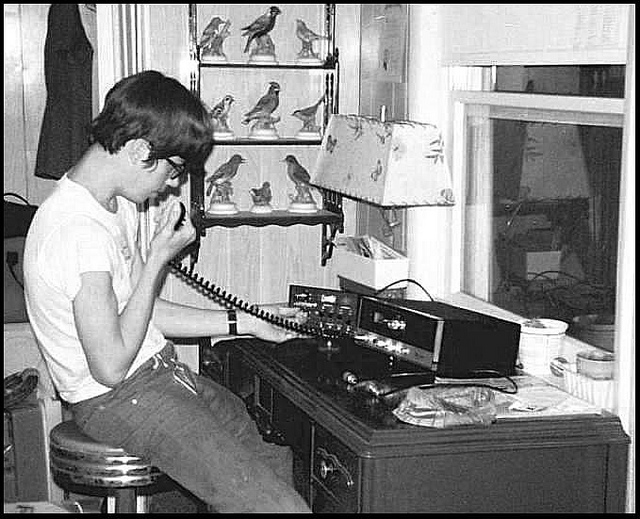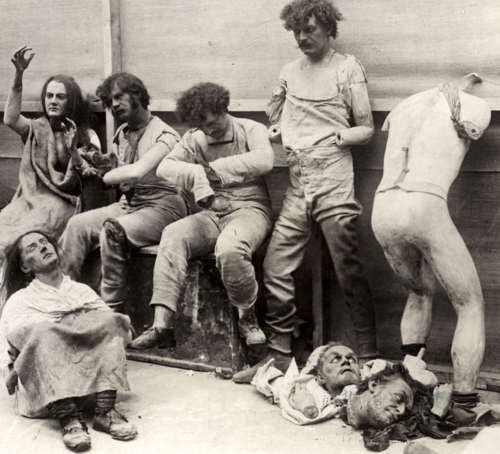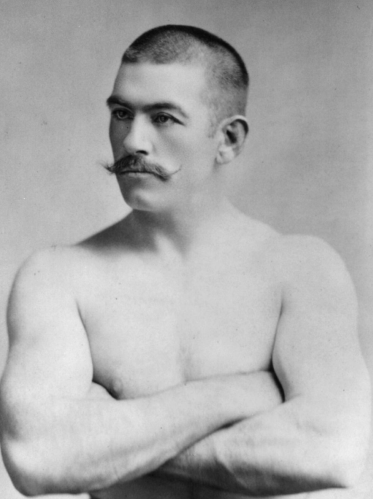Some 1960 archival footage touting Panorama, a multimedia educational tool.
You are currently browsing the archive for the Urban Studies category.
Tags: Charles Boyer, Edward R. Murrow, Miss Clark
In the New Republic, David A. Bell looks at the future role of brick and mortar libraries in a world without paper, pages and print. The opening:
“THEY ARE, in their very different ways, monuments of American civilization. The first is a building: a grand, beautiful Beaux-Arts structure of marble and stone occupying two blocks’ worth of Fifth Avenue in midtown Manhattan. The second is a delicate concoction of metal, plastic, and glass, just four and a half inches long, barely a third of an inch thick, and weighing five ounces. The first is the Stephen A. Schwarzman Building, the main branch of the New York Public Library (NYPL). The second is an iPhone. Yet despite their obvious differences, for many people today they serve the same purpose: to read books. And in a development that even just thirty years ago would have seemed like the most absurd science fiction, there are now far more books available, far more quickly, on the iPhone than in the New York Public Library.
It has been clear for some time now that this development would pose one of the greatest challenges that modern libraries—from institutions like the NYPL on down—have ever encountered. Put bluntly, one of their core functions now faces the prospect of obsolescence. What role will libraries have when patrons no longer need to go to them to consult or to borrow books?”
Tags: David A. Bell
Bill Gates predicted Apple’s Siri in 1987. From the great Paleofuture blog at the Smithsonian: “Gates predicts the perfection of a technology that has been around for decades, but one that many people of 2012 might associate with the name Siri: voice recognition. ‘Also, we will have serious voice recognition. I expect to wake up and say, ‘Show me some nice Da Vinci stuff,’ and my ceiling, a high-resolution display, will show me what I want to see—or call up any sort of music or video. The world will be online, and you will be able to simulate just about anything.'”
Tags: Bill Gates
free lunch
Would you like free lunch?
I would like to treat you. We can meet at a eatery in Manhattan.
I would like to talk to you about questions every person asks in life.
Questions such as:
- Why am I going through so much difficulty in life?
- Why do I have so many problems and troubles?
- Why am I feeling this emptyness inside?
- Why am I feeling so lonely and depressed?
- Is there true love out there?
If you are asking these questions, I would like to help you.
Please email me and let’s talk over lunch.
Incredible footage of extreme volunteerism via that excellent Robert Krulwich.
Tags: Robert Krulwich
Heber Z. Ricks had twelve wives, though it’s really not polite to count. He was a Mormon who really, really believed in the teachings of Brigham Young. The family man was profiled in the January 29, 1900 Brooklyn Daily Eagle. An excerpt:
“In the Valley of the Snake River, near where that stream forms the boundary line between Wyoming and Idaho, lives the father of the largest family on the American continent, and probably the world. The owner of this unique distinction is Heber Z. Ricks, one of the faithful followers in religion and practices of the late Brigham Young. Reliable persons who have known Ricks for many years say he has 12 wives and 66 children. Many of his sons and daughters have long since taken unto themselves helpmates for life and to these have been born 218 children, thereby bringing the number of souls in the Ricks family, exclusive of the venerable father, up to 296.
The members of the Ricks family are scattered over a stretch of country fourteen miles long by two miles wide. Heber Ricks has an even dozen ranches, which, with those of the sons and daughters, make quite a good size settlement. In the center of this settlement, a town called Ricksville has been established. Here are located a general store and a church. During week days the church is transformed into a school room, and a regularly employed teacher (usually one of the Ricks daughters) labors with the descendants of Heber Z. On Sundays, and not infrequently of an evening, services, which are, of course, strictly Mormon, are held. These religious meetings are usually presided over by the elder Ricks, and are very interesting, being conducted in that manner peculiar to the Mormon faith. In the absence of the ‘bishop,’ as the head of the family is known in the settlement, as is frequently the case when he makes a visit to one of his wives living in the extreme upper or lower ends of the colony, one of the sons will fill the pulpit and preach the doctrine of his father, says the Chicago Inter-Ocean.
Heber Z. Ricks is a giant in form and strength, although he is 77 years old. Little or nothing is known of his boyhood, except that he was reared on a farm in Western New York. He has never been known to say much about his early life other than he landed in St. Louis in 1842. From that city he went to a small settlement in the vicinity of where Independence, Mo., now stands, where he joined the Mormon Church. A little band of Mormons, with Ricks at their head, left the place early in the spring of 1848, and turned their faces toward Utah. Brigham Young’s party of 226 persons had gone on the previous year and left a faint trail, which Ricks and the party followed with great difficulty. The trail led them into the valley of the great Salt Lake, via Echo Canyon.
When Ricks left Missouri, it is said, he was a single man, but when he and his party reached Salt Lake valley, he was the possessor of five better halves. Settling near Salt Lake, Ricks continued to take unto himself additional wives until he had ten. In the year 1856, with the number of his wives increased to twelve, Ricks pulled up stakes and moved across the mountains through eastern Idaho to the valley of the Snake River. There, upon one of the most fertile spots to be found on the continent, he established himself. The first few years were ones of great activity for Ricks and his already large family. For a time, all lived in one large house, which was hastily erected, but later twelve houses, composed of roughly hewn logs, were constructed at different points along the river. To these were added, in due time, corrals and other outbuildings, and in a few years Ricksville was something more than a name.”
Tags: Brigham Young, Heber Z. Ricks
The Internet is an extension of the mind but so are books. People couldn’t memorize enough knowledge, so there were those faithful volumes of collected information to do the remembering, the reminding. But there are some not-so-subtle differences between the two tools. Readers would have to seek out information in books, whereas the Internet can be the proactive and anticipate what you want to know–what you need to know–before it even occurs to you. The functions are more complicated, as are the concerns. Although I’m in the camp that thinks it’s a huge win in the big picture. From Stephen Shankland’s new CNet article about Google’s planned future shock:
“What it’s now becoming is an extension of your mind, an omnipresent digital assistant that figures out what you need and supplies it before you even realize you need it.
Think of Google diagnosing your daughter’s illness early based on where she’s been, how alert she is, and her skin’s temperature, then driving your car to school to bring her home while you’re at work. Or Google translating an incomprehensible emergency announcement while you’re riding a train in foreign country. Or Google steering your investment portfolio away from a Ponzi scheme.
Google, in essence, becomes a part of you. Imagine Google playing a customized audio commentary based on what you look at while on a tourist trip and then sharing photo highlights with your friends as you go. Or Google taking over your car when it concludes based on your steering response time and blink rate that you’re no longer fit to drive. Or your Google glasses automatically beaming audio and video to the police when you say a phrase that indicates you’re being mugged.
Exciting? I think so. But it’s also, potentially, a profoundly creepy change.”
Tags: Stephen Shankland
We’re really going to eventually do this, aren’t we? We’re going to take the genetic materials of a Neanderthal and clone a member of the species. Some scientist somewhere won’t be able to resist the temptation. From a brief piece at Discover with paleoanthropologist Chris Stringer:
“Could we ever clone these extinct people?
Stringer: Science is moving on so fast. The first bit of Neanderthal mitochondrial DNA was recovered in 1997. No one then could have believed that 10 years later we might have most of the genome. And a few years after that, we’d have whole Denisovan and Neanderthal genomes available. So no one would have thought cloning was a possibility. Now, at least theoretically, if someone had enough money, and I’d say stupidity, to do it, you could cut and paste those Denisovan mutations into a modern human genome, and then implant that into an egg and then grow a Denisovan.
I think it would be completely unethical to do anything like that, but unfortunately someone with enough money, and vanity and arrogance, might attempt it one day.These creatures lived in the past in their own environments, in their own social groups. Bringing isolated individuals back, for our own curiosity or arrogant purposes, would be completely wrong.”
Tags: Chris Stringer
Alex Haley appears on To Tell the Truth in 1972 to discuss his genealogical investigations, four years before Roots was published and became a phenomenon.
Tags: Alex Haley
Dr. Fredric Neuman’s harrowing Psychology Today article, “The Cyclops Child,” is one of the more bruising things I’ve read in a long time. It’s the psychiatrist’s recollection of being witness to horribly, hopelessly deformed newborns when he was an intern 50 years ago. The doctors would tell the parents that the child was born dead, and the infant would surreptitiously be given minimal care until it passed away. It was done to spare the feelings of the parents, but it’s obvious they should have been told and involved in the decision. Regardless, it’s a heartrending story. The opening paragraph:
“Probably every physician can think of one patient who affected him more than any other. The patient who has haunted me through the years was a child that I saw for only a little time at the very beginning of my career. I was an intern at a Catholic institution. I mention that because it seems to me relevant to the ethical considerations that swirled about the care of this infant. When this child was born, the obstetrician, looking at it was horrified. It was a ‘monster.’ That was the medical term used to describe a grossly misshapen baby. The doctor was concerned, then, first of all, about the effect on its mother of seeing the child. Therefore, he told the parents that it was born dead; and that the body had been disposed of. But the child was alive. This particular ‘monster’ had deformities that were not consistent with it living for any length of time. The obstetrician must have recognized that immediately and chose to spare the parents the special anguish of looking at and knowing about this abnormal birth. But did he have the right to tell them a lie about such a critical matter? I’m not sure that there is a law to deal with such a strange situation, but I am sure the obstetrician violated medical canons. He short-circuited the parents’ wishes and concerns. Plainly, they had the right to know the truth. If a medical malpractice action had been instituted, the doctor would have been liable. By telling this lie, he was risking his career. The other people in the delivery suite were also complicit and also liable. As far as I was concerned, however, he had done the right thing.” (Thanks Browser.)
Tags: Fredric Neuman
I generally applaud contrarians, even when I completely disagree with them. People who go against the grain are very useful to the larger discussion. Baseball stats guru Bill James has long been one of those flies in the ointment pointing out truths about sports and beyond and making the conversation richer for it. But it will be tough to ever take his reasoning seriously again after his ludicrous defense of Joe Paterno’s role in enabling Jerry Sandusky’s disgraceful behavior. Why James would try to split hairs over minor points when the preponderance of evidence against Paterno and Penn State stares him in the face is beyond me. He’s permanently damaged his credibility. From James:
“The Freeh reports states quite explicitly and at least six times (a) that the 1998 incident did NOT involve any criminal conduct—on the part of Sandusky or anyone else—and (b) that Paterno had forced the resignation of Sandusky before the 1998 incident occurred … In any case, what EXACTLY is it that Paterno should have done? Fire him again? It is preposterous to argue, in my view, that PATERNO should have taken action after all of the people who were legally charged to take action had thoroughly examined the case and decided that no action was appropriate.”
Tags: Bill James
Tags: Arthur C. Clarke
From “The Strongest Man in the World,” Burkhard Bilger’s ungated New Yorker piece about Brian Shaw, a Colorado man born to move mountains, and the new wave of strength competitions:
“In the summer of 2005, when Shaw was twenty-three, he went to Las Vegas for a strength-and-conditioning convention. He was feeling a little adrift. He had a degree in wellness management from Black Hills State University, in South Dakota, and was due to start a master’s program at Arizona State that fall. But after moving to Tempe, a few weeks earlier, and working out with the football team, he was beginning to have second thoughts. ‘This was a big Division I, Pac-10 school, but I was a little surprised, to be honest,’ he told me. ‘I was so much stronger than all of them.’ One day at the convention, Shaw came upon a booth run by Sorinex, a company that has designed weight-lifting systems for the Denver Broncos and other football programs. The founder, Richard Sorin, liked to collect equipment used by old-time strongmen and had set out a few items for passersby to try. There were some kettle bells lying around, like cannonballs with handles attached, and a clumsy-looking thing called a Thomas Inch dumbbell.
Inch was an early-twentieth-century British strongman famous for his grip. His dumbbell, made of cast iron, weighed a hundred and seventy-two pounds and had a handle as thick as a tin can, difficult to grasp. In his stage shows, Inch would offer a prize of more than twenty thousand dollars in today’s currency to anyone who could lift the dumbbell off the floor with one hand. For more than fifty years, no one but Inch managed it, and only a few dozen have done so in the half century since. ‘A thousand people will try to lift it in a weekend, and a thousand won’t lift it,’ Sorin told me. ‘A lot of strong people have left with their tails between their legs.’ It came as something of a shock, therefore, to see Shaw reach over and pick up the dumbbell as if it were a paperweight. ‘He was just standing there with a blank look on his face,’ Sorin said. ‘It was, like, What’s so very hard about this?’
When Shaw set down the dumbbell and walked away, Sorin ran over to find him in the crowd. ‘His eyes were huge,’ Shaw recalls. ‘He said, ‘Can you do that again?’ And I said, ‘Of course I can.’ So he took a picture and sent it to me afterward.’ Sorin went on to tell Shaw about the modern strongman circuit—an extreme sport, based on the kinds of feat performed by men like Inch, which had a growing following worldwide. ‘He said that my kind of strength was unbelievable. It was a one in a million. If I didn’t do something with my abilities, I was stupid. That was pretty cool.’
Three months later, Shaw won his first strongman event.”
•••••••••
Shaw deadlifting 1073 pounds this year with a torn biceps:
Tags: Brian Shaw, Burkhard Bilger
What are the real reasons why women say “I just don’t feel Chemistry?” (Midtown)
I am a really good looking guy and I went out to a bar with a woman that I met online. We had good conversation and I thought that things went well. We had good conversation and we both enjoy traveling, adventure sports, fitness and going to bars and enjoying good beer. We had good conversation about traveling and other things and all of a sudden she says that “She just does not feel the chemistry.” We both live at home now with our families and we are in our 30’s. She got laid off from her job and I work 2 jobs. Also she is a little bit fat where as I am in really good shape. Also she likes country music and I am not into country music. But what would make her say that? What are the real reason’s why a woman would say I just don’t feel the chemistry?
From the August 4, 1897 Brooklyn Daily Eagle:
“Bay Shore, L.I.–J. Hollenhauer of Brooklyn, summering at Bay Shore, has just lost one of his very valuable horses. The animal became crazy, it is said, and had to be shot.”
Tags: J. Hollenhauer
My little brother, that provocateur Steven Boone, summing up the loud, jarring, cynical last decade of multiplex fare in a recent article at Capital New York:
“The video game industry is currently in a war that the movie industry fought and decided last decade. It’s a struggle between loud, assaultive, photorealistic game design that rewards wispy attention spans while demanding minimal problem-solving skills of its players and … games where shotguns to the face and chainsaws to the jugular are not so essential.
The American film industry settled on high-resolution ultraviolence as the default multiplex experience sometime after 9/11 and sometime before its superheroic screen response, The Dark Knight. The violence is not necessarily a matter of content but of the graceless way shots jam up against one another now, keeping us invested through a constant state of agitation where narrative suspense used to do the trick.
During that decade, many viewers retreated from mainstream blockbuster cinema into the bosom of what critics call a television renaissance. So many smart, adult, spellbinding, hilarious TV shows, the story goes. Any stragglers still hoping for an immersive experience at the multiplex were suckers and masochists.”
•••••••••
From “Fuck You Productions”:
Tags: Steven Boone
How cool is this? The New York Review of Books has pulled from its archives a 1981 essay by Murray Kempton about Woody Guthrie, who had a machine that attempted to kill fascists, though they’re still there. Kempton’s article is a review of several Guthrie books that were published just as a nostalgia salesman was moving into the White House, having promised a return to a past that never existed. People believed the narrative and began voting their unlikely dreams instead of their realities. The result was this land became less and less yours and mine. The opening of the great piece:
“The genius of our politics is the art of distracting the resentments of a cheated middle class and letting them fall upon a worse-cheated lower class. And so we have the revolution of Woody Guthrie’s dream: the Okies and their sons and daughters have elected a one-time California labor agitator president of the United States. This triumphant populist tribune is, of course, Mr. Reagan.
Joe Klein reminds us that Guthrie’s ‘This Land Is Your Land’ has been recorded by such repositories of the national self-satisfaction as the Mormon Tabernacle Choir, the New Christy Minstrels, and Tex Ritter. It is as secure in the pantheon of celebratory anthems as ‘America the Beautiful’ and probably sits higher in the affections of school children than ‘The Star Spangled Banner.’ Marching bands saluted the new president with its strains when they passed before him on Inauguration Day.
Woody Guthrie had composed ‘This Land Is Your Land’ as a bitter parody of ‘God Bless America.’ It had originally closed with the stanza:
One bright sunny morning in the shadow of the steeple
By the Relief office I saw my people
As they stood hungry, I stood there wondering if
God blessed America for me.
These words and like notes of alienation were excised from ‘This Land Is Your Land’ when it was smoothed into the affirmative expression that soothes us today. Guthrie accepted the amendment, but the pain of the sacrifice lingered so long that, in the early 1960s, when he was near dying, he took his son, Arlo, into the backyard and taught him the old verses, because, Klein tells us, ‘he was afraid that if Arlo didn’t learn them, they’d be forgotten.’
The genius of our politics also extends to the transformation of the song of protest into the hymn of acceptance.”
•••••••••
“Yes, as through this world I’ve wandered / I’ve seen lots of funny men / Some will rob you with a six-gun / And some with a fountain pen”:
Tags: Arlo Guthrie, Joe Klein, Murray Kempton, Woody Guthrie
Before the Internet and social networks, people had just as great a desire to be connected, but the proper medium and infrastructure didn’t exist. For a couple of years in the 1970s, people reached out to one another via CB radio, though almost all of them hid behind a handle. They hadn’t yet perfected our brand of ego and exhibitionism. Footage from 1977.
China is on pace to become by far the world’s largest auto consumer in the near term. Sure, an economic collapse could slow that growth, but it will certainly be a world leader in the category. A nation with that much consumption, that much control over its citizenry and a huge sense of its own destiny, could decide the future of transportation and alternative energy. What if China announced it was allowing only electric cars by a certain date and then built the infrastructure to support that shift with the same zeal that it shows in routinely scraping the sky? From the Next Big Future:
“Auto sales in China may rise to 19.2 million this year, about 1 million lower than AlixPartners estimated last year. Sales in the world’s most populous country may increase to 21.4 million in 2013 and 23.5 million in 2014, the report said.
It is estimated that China’s automobile market will keep a stable growth from 2012 to 2015, with a compound annual growth rate of 8.1%. The sales volume is expected to reach 25.287 million by 2015.
China could double US car sales in 2017 / 2018 and be equal the combined car sales in Western Europe and the United States.”
••••••••••
Jack Nicholson goes gasless in 1978:
Interesting 1961 episode of To Tell the Truth which featured sculptor Korczak Ziolkowski, who blasted and carved a mountain-scale monument of Crazy Horse in South Dakota. The artist was approached by Chief Henry Standing Bear who asked him to pay homage to a Native American hero. It began a lifetime work for the self-trained sculptor. Ziolkowski passed away in 1982, but his family has continued the construction.
An eyewitness report about the death of Crazy Horse from the September 27, 1877 New York Times: “The Schoharie Republican prints a private letter, addressed to Francisco Wood, of the village, by his son, Edwin D., who is in the Army, and as one of the guard, was present at the capture and killing of Crazy Horse. The writer said, under the date of September 16: ‘We have had considerable excitement here within the last two weeks on account of Crazy Horse. We started out on the 4th of this month with eight companies of the Third Cavalry to bring him and his band into the agency, but did not succeed in capturing him. The next day he was brought in by a lot of friendly Indians, who are enlisted and paid as soldiers. There were also a number of his own warriors with him. When the carriage drove to the guard-house, Crazy Horse got out and walked a short distance, the refused to go in. Then the struggle began. The guard surrounded him, and one of them stabbed him with a bayonet. He was then taken in the Adjutant’s office where he died in about six hours. There are all sorts of rumors about the way he was killed. Some of the papers say he stabbed himself, others say he was killed by another Indian, called Little Big Man, but I was one of the guards myself, and was there when he was stabbed, and know the man who did it. I think this was the only thing that saved a row, because there were a great many Indians there at the time, and one shot would have been sufficient to start a fight. But I think there will be no more trouble after this, because he was undoubtedly the greatest warrior that ever lived. His father was with him in all his battles with the whites; he was also with him at the time of his death. Crazy Horse was 37 years of age. He was born on the North Fork of the Cheyenne River. He fought closer to the whites than any other chief that ever lived. He has killed 37 white men beside what he has killed in battle. The other chiefs were all jealous of him. He could have been the chief of all the Indians, but would not; he only wanted to roam around the country with his band and fight the Snakes and the Crows and steal horses. The next morning he was taken to the Spotted Tail Agency, where he is buried.”
Tags: Crazy Horse, Edwin D. Wood, Francisco Wood, Henry Standing Bear, Korczak Ziolkowski, Little Big Man
Excellent work by Jason DeParle in the New York Times analyzing a lesser-discussed cause of American income disparity, children in working-poor homes being raised by single parents. An excerpt:
“The economic storms of recent years have raised concerns about growing inequality and questions about a core national faith, that even Americans of humble backgrounds have a good chance of getting ahead. Most of the discussion has focused on labor market forces like falling blue-collar wages and lavish Wall Street pay.
But striking changes in family structure have also broadened income gaps and posed new barriers to upward mobility. College-educated Americans like the Faulkners are increasingly likely to marry one another, compounding their growing advantages in pay. Less-educated women like Ms. Schairer, who left college without finishing her degree, are growing less likely to marry at all, raising children on pinched paychecks that come in ones, not twos.
Estimates vary widely, but scholars have said that changes in marriage patterns — as opposed to changes in individual earnings — may account for as much as 40 percent of the growth in certain measures of inequality. Long a nation of economic extremes, the United States is also becoming a society of family haves and family have-nots, with marriage and its rewards evermore confined to the fortunate classes.
‘It is the privileged Americans who are marrying, and marrying helps them stay privileged,’ said Andrew Cherlin, a sociologist at Johns Hopkins University.”
Tags: Jason DeParle
From the March 18, 1895 Brooklyn Daily Eagle:
“Muncie Ind.–An undertaker at Red Key claims that he has secured a secret from an old hermit which promises to revolutionize the art of embalming. He learned it of an ancient man who lives in the mountains of West Virginia, in a lonely cabin, and residents of the neighborhood believed him insane and that his house was haunted. A visit to the hermit’s house was paid by the undertaker and a friend. The floors of the two lower rooms of the cabin were carpeted with the finest rugs made from the skins of animals and preserved by the hermit. The rugs consisted of the skins of coons, cats, snakes, frogs, minks, etc. The skins were perfectly preserved and were as natural as if just taken from the animal. Upstairs were three bodies, which the hermit said he had obtained years ago. They looked as if death had come but yesterday. The hermit also had bodies of different animals all looking as natural as life. The first experiment with the fluid will be made in a medical college in Baltimore, Md.”
John L. Sullivan, gloved boxing’s first heavyweight champion, made a fortune and ended up a broken-down charity case like so many great pugilists. He had a wild ride of living large, drinking hard, acting on stage, losing money, being sued, etc. And sometimes he wasn’t the source of the problems that plagued him. From the October 27 1889 Brooklyn Daily Eagle:
“Boston, Mass.–‘I will kill John L. Sullivan,’ shouted Tommie Shea this afternoon. He was armed with a big revolver and had been drinking heavily. Instead of killing Sullivan, Shea lies at the City Hospital to-night with his throat cut from ear to ear by one of Sullivan’s companions and will probably die. Recently Liney Tracey, a Brooklyn boxer, who was a second for Sullivan in a fight with Kilrain, and who was booked for the champion’s latest proposed sparring tour, was talking with Shea. The latter had just been released form State Prison, having served three years for highway robbery.
Sullivan saw them, and, calling Tracy one side, said: ‘Keep away from that man, he’s a crook.’
Tracy very foolishly told Shea what Sullivan had said and Shea swore he would kill the champion as soon as he had opportunity.
About 2 o’clock this afternoon Shea entered Sugarman’s pawn shop and bought a thirty-eight calibre bull dog revolver for $2.50.
Meeting friends later, he told them he had a revolver and what he intended to do. A policeman soon after induced Shea to give up the revolver. Shea left the officer, telling his friends he intended to buy another gun. Sullivan sat in a high chair in Hogarty’s barber shop at 4:30 o’clock this afternoon having his shoes polished when Shea entered and sat down in a chair for a shine. Then a wrangle of words began between the champion and the man in the chair. Remarks similar to this were made by Sullivan to Shea: ‘You’re an old woman, anybody could lick you.’
In the barber shop was Tommy Kelly, an ex-lightweight pugilist, who won his fame when he fought Siddons Mouse on an Island down the harbor some time ago. Kelly took a hand and a bloody hand it proved to be.
Kelly had been drinking. He seized one of the Italian’s razors, and, approaching Shea, drew it across his throat, cutting a gash from ear to ear. The blood flowed a stream and there was intense excitement in the little shop. Sullivan jumped from his seat, took the razor away from Kelly and kicked him out into the street. Shea was taken, weak from loss of blood, to the hospital, and late to-night the physicians declared him almost beyond hope of recovery. Kelly gave himself up to the police. So far he has made no statement as to his side of the case.”
Tags: John L. Sullivan, Liney Tracey, Tommie Shea, Tommy Kelly
HOW DO I AVOID SMALL TALK? (Midtown)
I’m introverted and get annoyed quickly with pseudo, trivial mundane conversations, I’ve been labelled antisocial etc, But I’m extremely talkative when I’m amongst my Professor or two philosophers I met recently around union square. So clearly I’m not anti-social, I simply don’t find small talk interesting. I have nothing against people’s personal socializing objectives, But it’s just doesn’t interest me. I’m not intelligent but I’m awe of information and solving problems and love reading and constantly educating myself.
I encounter these ‘Fountain Of Useless Information People’ constantly.
Please email me and tell me what polite steps i can take to avoid them. I desperately want to eradicate or contain these mediocre talkers that consume my time.
Alicia
West Village.
Tags: Rosa Parks




